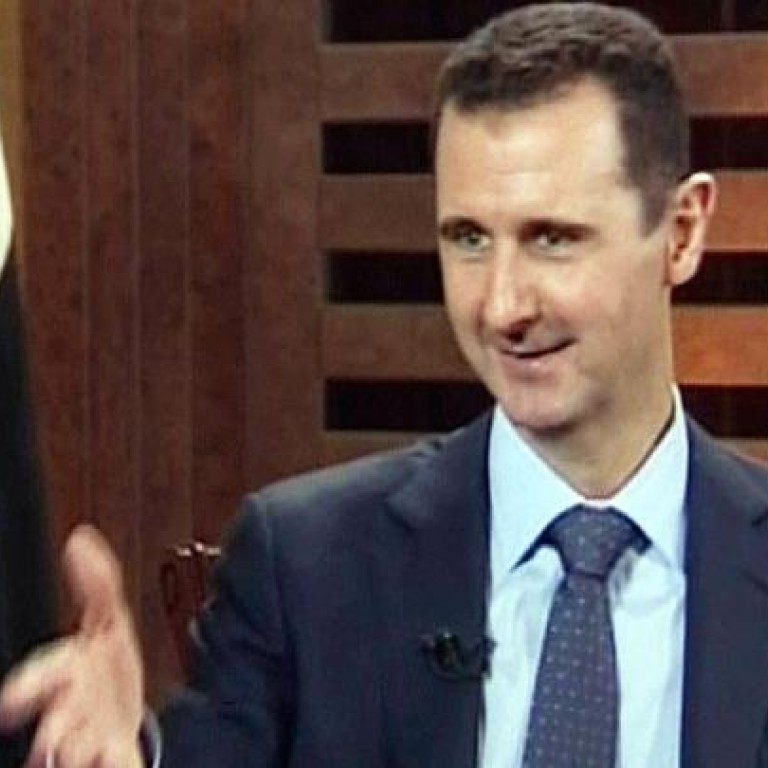
Syria needs more time needed to end conflict, says Assad
Syria's President Bashar al-Assad vowed in comments broadcast on Wednesday that his forces would win the conflict ravaging Syria but that more time was needed, as rebels targeted a northern military airport.
Assad’s statements, in an interview with pro-regime Addounia channel, came a day after a car bomb rocked a funeral in a Damascus suburb killing 27 people, and as a watchdog reported 189 people killed countrywide on Tuesday.
“I can summarise in one phrase: we are progressing, the situation on the ground is better but we have not yet won – this will take more time,” Assad said in excerpts of the interview broadcast by the private channel.
Assad also scoffed at an idea being championed by Turkey of creating buffer zones within Syria to receive those displaced by the conflict.
“Talk of buffer zones firstly is not on the table and secondly it is an unrealistic idea by hostile countries and the enemies of Syria,” he added.
French President Francois Hollande said on Monday France was working with its partners on the possible establishment of such buffer zones, which are aimed at preventing those displaced by the fighting flooding over the borders into neighbouring states.
His foreign minister, Laurent Fabius, admitted Wednesday that plans to create buffer zones in Syria were “very complicated” and would require the imposition of partial no-fly zones.
Assad also mocked those defecting from his regime, saying their departure amounted to a “self-cleansing of the government firstly and the country generally.”
The Syrian leader paid tribute to government security forces, who have been fighting rebels nationwide, for their “heroic conduct.”
“Despite several mistakes, there is a strong bond” between the regime and the Syrian people, Assad insisted, boasting the support of the majority of the country’s population.
“Everyone is worried about their country, that is normal. But the rebels will not be able to spread fear, they never will,” he said.
“I say to Syrians, destiny is in your hands, and not in the hands of others.”
The Syrian Observatory for Human Rights, meanwhile, said that fierce fighting broke out on Wednesday between the Syrian army and rebels near Taftanaz military airport, between the northern cities of Aleppo and Idlib.
Explosions could be heard from the airport, a base for fighter planes and helicopters running sorties over the rebel strongholds of Aleppo and Idlib, according to the Britain-based watchdog.
Taftanaz has been the target of several attacks by insurgents entrenched in these two cities, which have suffered daily shelling by government troops.
The battle for Aleppo, Syria’s second largest city, has lasted for over a month, with the army unable to dislodge the rebels.
Regime forces meanwhile again shelled rebel strongholds in a belt of outer eastern suburbs of Damascus on Wednesday, according to the Local Co-ordination Committees, comprising activists on the ground.
The Observatory has reported fierce shelling for days of the neighbourhoods as the army pressed its drive to push rebel fighters out of the capital.
State-run newspaper Tishrin said Tuesday’s car bombing of a funeral in Damascus was an indication that the “terrorist” groups have reached a very advanced stage of despair and bankruptcy.”
The bombing hit Jaramana, a mainly Druze and Christian town on the southeastern outskirts of Damascus that the observatory described as generally supportive of Assad’s government.
“Jaramana will only serve as a new incentive to continue to root out terrorism and hold its supporters and perpetrators accountable,” Tishrin said.
State media blamed rebel fighters for the bombing, but the opposition Syrian National Council accused Assad’s regime of staging the bombing against its own supporters in a bid to divert attention from the killings of hundreds of people during an army assault on a largely Sunni Muslim suburb of the capital last week.
Some 80 per cent of Syrians are Sunni Muslim, while around 10 per cent belong to Assad’s Alawite community, five per cent are Christian, three per cent Druze and one per cent Ismaili.
The opposition draws much of its support from the Sunni majority, who have borne the brunt of the government’s crackdown.
Activists say around 25,000 people have been killed since the uprising against Assad’s rule broke out in March last year, while the United Nations says more than 214,000 people have fled to neighbouring countries.
Underscoring the growing humanitarian crisis, it emerged that seven Syrians, two of them children, who attempted to flee the conflict by boat earlier this month, drowned off the coast of the nearby Mediterranean island of Cyprus.
The UN refugee agency said it was the “first case” of Syrian refugees trying to make the 100 kilometre sea passage.
“It is hard to know if this is a trend,” UNHCR spokeswoman Melissa Fleming told reporters in Geneva.

.png?itok=arIb17P0)